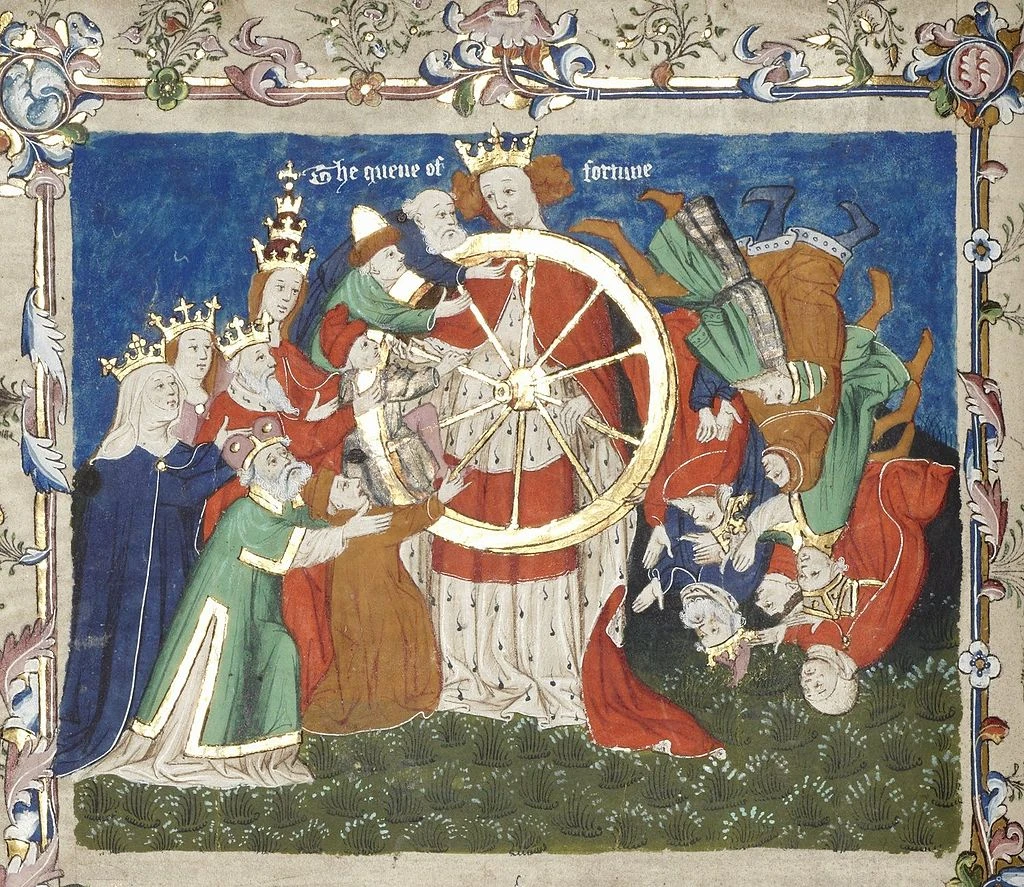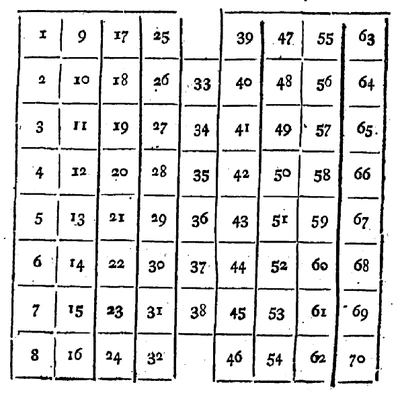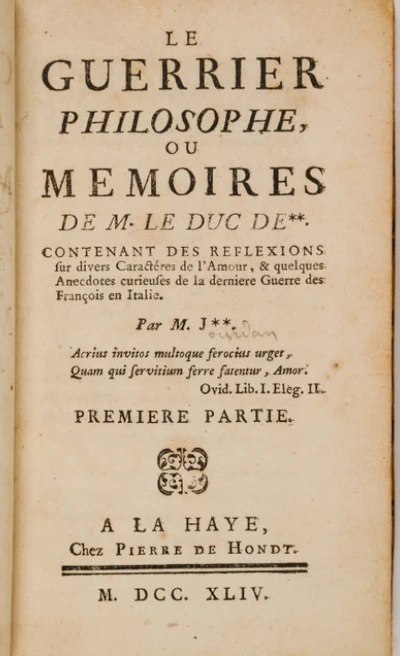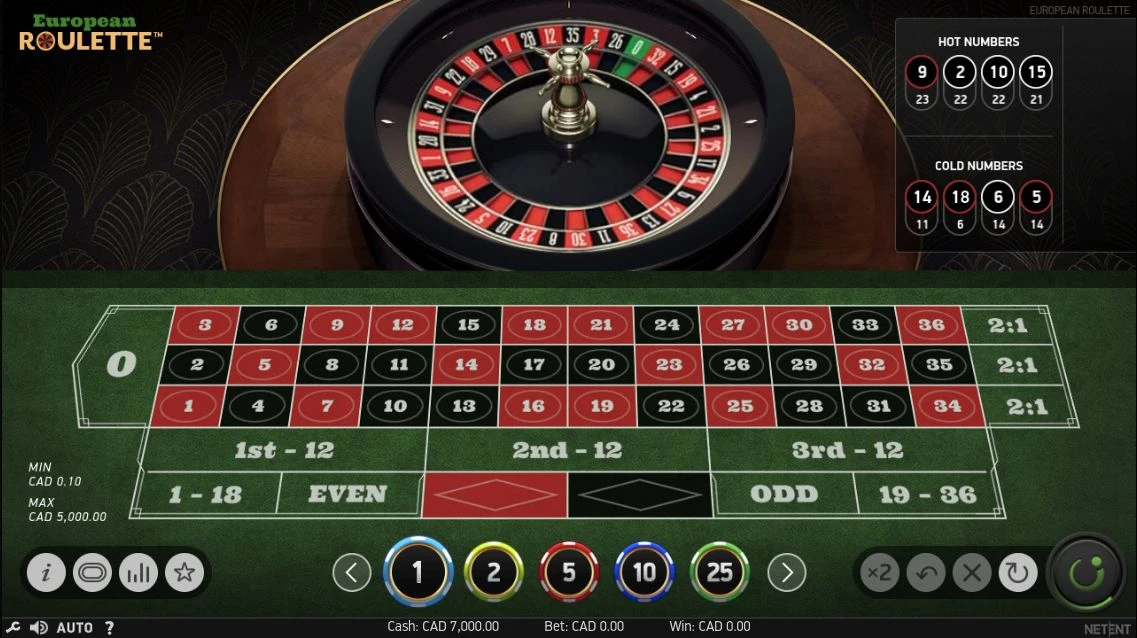
Who Invented Roulette Wheel?
The invention and origin of the roulette wheel are shrouded in mystery, with various theories and controversies surrounding its creation. Despite its widespread popularity in casinos worldwide, the exact beginnings of this iconic game remain unclear. Some credit its invention to individuals in late 18th-century Paris, while others trace its roots back to earlier European games.
In this article, we will delve into the historical records and explore different perspectives to shed light on the enigmatic origins of the roulette wheel. Join us as we try to see more clearly the development and evolution of one of the most captivating casino games ever created.
The Controversial Origins of Roulette
Mythological origin: the wheel of fortune
In medieval and ancient philosophy, the Wheel of Fortune, or Rota Fortunae, serves as a powerful symbol of Fate's unpredictable and capricious nature.
- A metaphor for life : This concept, deeply embedded in the cultural and philosophical traditions of the time, depicted Fortune as a goddess who spun a great wheel, randomly dictating the destinies of individuals. Kings could fall into ruin, and paupers could rise to prominence with a single turn of her wheel. The metaphor of the Wheel of Fortune underscores the inherent uncertainty of life, a theme that resonates with the very essence of gambling.
This philosophical backdrop provides an intriguing context for the development of games like roulette, where the spin of the wheel holds the promise of fortune or misfortune in equal measure.

Ancient Roots: Games of Chance in Rome and Greece
Under ancient Rome and Greece, soldiers engaged in various games of chance, some of which bore a resemblance to modern roulette.
- Ancestor of Gambling : These early forms of gambling were often rudimentary and involved spinning a shield or other circular objects to predict outcomes. However, the documentation of these activities is sparse and often fragmented, making it challenging to draw direct connections to the roulette game we know today. Despite the limited historical records, these ancient games highlight a long-standing human fascination with chance and fortune, laying a cultural groundwork that would eventually influence the creation of more structured gambling games in later centuries.
But all this is poorly documented, and the sources on this subject are not very explicit.
Chinese Roots of Roulette?
Some theories suggest that roulette may be based on an ancient Chinese board game.
In this game, players would arrange 37 animal figurines on a numbered square grid, with the total of the numbers adding up to 666, mirroring the sum of the numbers on a modern roulette wheel.
- This game was imported to Europe : Dominican monks, who encountered this game during their travels, were captivated by it and brought it back to Europe. Upon their return, they introduced modifications to the game, transforming the square grid into a circular layout and adding a special slot for the number zero. This adaptation is believed by some to be a precursor to the contemporary roulette wheel, reflecting how cross-cultural exchanges can influence and shape the evolution of games.
But again it is difficult to find very reliable sources which confirm this hypothesis.
Blaise Pascal: Influence on the History of Roulette
Despite widespread claims on many websites, Blaise Pascal is not the inventor of roulette.
- Contribution to the mathematics of Gambling : While it is true that primitive versions of roulette existed long before Pascal's time, his contributions to the field of probability have often been linked to the development of the game. Pascal, a renowned mathematician and philosopher, authored a treatise on probability theory, which laid the groundwork for understanding randomness and chance. Although he did not create the roulette wheel, his research likely influenced the mathematical principles that underpin the game. Thus, while Pascal may not have directly invented roulette, his work in probability theory was instrumental in shaping the modern understanding of gambling and games of chance.
- The source of the confusion: A source of confusion regarding Blaise Pascal's association with the invention of roulette stems from his treatise titled "History of Roulette." However, this work does not concern the game of roulette as we know it today. Instead, Pascal's treatise deals with the mathematical study of curves, specifically the cycloid, which is sometimes referred to as a "roulette" in mathematical terminology. This misunderstanding has led many to incorrectly credit Pascal with the invention of the roulette game. In reality, his treatise focuses on the properties and applications of these geometric curves, rather than the gambling device.
This distinction is crucial in accurately understanding Pascal's contributions and the true origins of the roulette game.
The Italian Game Biribi: A Historical Predecessor to Modern Roulette
The Italian game Biribi is often regarded as a historical predecessor to modern roulette.
- A cousin of roulette : Like roulette, Biribi involved making bets on numbers and used a wheel-like mechanism to determine the outcome. However, while the two games share some similarities, Biribi is more accurately described as a cousin to roulette rather than its direct origin. The mechanics of Biribi differed significantly, as players would place their bets on a numbered board, and the winning number was drawn from a bag rather than spun on a wheel.
This distinction in gameplay means that while Biribi influenced the development of roulette, it did not operate in the same manner, highlighting the evolution of gambling games over time.

The 18th Century English Even-Odd Game: Resembling Roulette
In the 18th century, the English game Even-Odd, also known as E/O, bore a striking resemblance to roulette.
- Similarities and differences with roulette : Like roulette, E/O involved a wheel and a ball. However, instead of numbered sections, the E/O wheel featured 20 sections marked with an "E" for Even and 20 sections marked with an "O" for Odd. In place of a zero, certain sections were designated as house sections, providing the house with its edge. Players would bet on whether the ball would land in an Even or Odd section, and the presence of house sections ensured that the game maintained a house advantage.
This game, though different in its details, shared core mechanics with roulette, demonstrating the diverse ways wheels and chance have been employed in gambling games over time.
Other Ancestors of Roulette: Hoca, Portique, and Roly Poly
In addition to Biribi and Even-Odd, several other games are frequently cited as ancestors of roulette, including Hoca, Portique, and Roly Poly.
- Hoca, an Italian game popular in the 17th century, involved a board and betting on numbers, much like early versions of roulette.
- The game of Portique featured a ball rolling down an inclined plane into numbered compartments, echoing the randomizing element central to roulette.
- Roly Poly, or Roly-Poly, was an English game that used a spinning wheel marked with Even and Odd sections, similar to the mechanics of roulette.
These games, each with their unique features and rules, contributed to the development of roulette by incorporating elements of chance, betting, and the use of a spinning device, illustrating the rich and varied history of gambling games that led to the creation of modern roulette.
2 - The first mentions of roulette games: in France in the 18th century
Early Mentions of Roulette : in legal documents
One of the oldest documents clearly mentioning roulette is a legal text from the early 18th century.
- The first known reference to "roulette" appears in a court case in Bordeaux in 1711, where the game was condemned by the authorities for the chaos and disturbances it caused. This early legal mention indicates that the game was already in existence and significant enough to attract judicial attention.
- Other mentions in the 18th : Throughout the mid-18th century, roulette continued to be mentioned in various legal documents. For example, a 1726 police ordinance in Paris specifically prohibited the game, reflecting its spread and the social concerns it generated. In Bordeaux again, subsequent legal records from the 1730s and 1740s reference roulette in the context of efforts to regulate or suppress gambling activities.
These legal texts not only provide valuable historical evidence of roulette's early existence and popularity but also highlight the controversies and regulatory challenges it posed, illustrating how roulette gradually became an established and contentious form of gambling long before the development of its modern version.
The first descriptions of the roulette games : old versions differ from the modern one
A long description of roulette appears in the April 1726 issue of Le Mercure de France (pp. 845-846).
- Not quite the same game: However, the surprise lies in encountering a game that is quite different from the modern version of roulette we recognize today. This early depiction describes a game played on an inclined wooden board with a ball that was pushed up a rigged channel and allowed to roll down, bouncing off small obstacles before settling into one of several compartments at the bottom. These compartments were marked with different colors, typically black and white, and the outcome depended on where the ball finally rested. This version, which resembles more of a bowling roulette or bagatelle game, lacks the numbered wheel and pockets that characterize contemporary roulette. Despite sharing the name, this early form of roulette highlights the varied and evolving nature of games of chance, illustrating how the concept of roulette gradually transformed into the well-known casino game we see today.
Roulette found a prominent place in the gaming culture of Paris at the hotels of Soissons and Gêvres (or Gesvres) between 1726 and 1741.
- Casinos before their time : These establishments were archetypes of large-scale gaming venues, true casinos avant la lettre, attracting the elite of Parisian society. The hotel of Soissons was under the patronage of the Prince of Carignan, while the hotel of Gêvres was operated by the Duke of Gesvres. These grand establishments offered a variety of games, including the early forms of roulette, and maintained dominance in the Parisian gambling scene until their closure in 1741.
Whose games have been described by authors :
- The detailed accounts of these gaming houses, and their influence on the development of roulette, are notably described by Jean-Baptiste Jourdan in his "Guerrier Philosophe" (1744) and Ange Goudar in his "Histoire des Grecs" (1757). Their writings provide a vivid portrayal of the lavish gaming practices and the pivotal role these hotels played in the evolution of roulette, underscoring the luxurious yet controversial nature of gambling in early 18th-century Paris. But the games described still differ from the modern games that we all know.

- Further details about this old form of roulette are found in Pierre-Nicolas Huyn's "The Theory of Games of Chance," published in 1788. Huyn provides a comprehensive description of the game as it was played in these early Parisian establishments. His account includes the layout and mechanics of the roulette wheel used at that time, offering valuable insights into the game's development. Huyn's work highlights how these early versions of roulette were integral to the rich tapestry of gambling history, bridging the gap between primitive forms and the modern casino game.
The first descriptions of modern roulette appeared in France at the end of the 18th century
The transition from ancient games to the modern roulette we recognize today may have been the work of Denis-François Brune, a prominent games farmer in Paris during Year VI of the French Revolutionary Calendar (1797-1798).
- Brune is credited with "inventing a game called roulette : a game from the biribis family, since it is played by the little and the big side, and even the numbers." This description suggests that Brune's version of roulette incorporated elements of the Italian game Biribi, blending them with features that would become central to modern roulette. His innovation likely included the introduction of numbered slots and the distinctive red and black pockets, bridging the gap between older, simpler games of chance and the more structured, strategic game of roulette that captivated players in Parisian casinos.
But this remains a theory, which is not supported by explicit sources.
- An older description? The game of roulette has been played in its present form since as early as 1796 in Paris. One of the earliest descriptions of this modern version is found in the French novel "La Roulette" by Jaques Lablee. This novel, set in the bustling Palais Royal, provides a detailed account of the roulette wheel as it was known at the time. Although the events are described in 1796, the novel itself was published in 1802. Lablee's depiction includes the characteristic numbered wheel and the distinctive red and black pockets, highlighting the game's enduring appeal and the atmosphere of the Parisian gambling scene.
This early literary reference underscores the established presence of roulette in its contemporary form at the close of the 18th century, reflecting the game's transition from various ancestral influences to the recognizable format enjoyed by players today.
- Oldest explicit description : In 1799, Alexandre-Toussaint de Gaigne's narrative "My Story at Thirty-One, and That of All Those Who Play It" provides the oldest explicit description of modern roulette. In this account, de Gaigne notes, "Today we play a new game, which the public calls Roulette, and which its inventor calls Athenian." This description is significant as it marks the first published reference to the roulette game in its modern form, complete with the numbered wheel and the red and black pockets that are now synonymous with the game.
This detailed portrayal highlights the transition to the contemporary version of roulette, reflecting its establishment in the gambling culture of late 18th-century Paris and solidifying its place in the history of casino games. We learn from these descriptions that the roulette wheels used in the casinos of Paris in the late 1790s had red for the single zero and black for the double zero. To avoid confusion, the color green was selected for the zeros in roulette wheels starting in the 1800s. It is one of the last developments before the advent of modern games still played today.
The appearance and development of modern roulette
The Invention of European Roulette with a Single Zero
European roulette, featuring a single zero, was invented in Germany.
- In 1843, in the German spa casino town of Bad Homburg, Frenchmen François and Louis Blanc introduced this innovative single zero roulette wheel. Their goal was to attract gamblers by offering better odds compared to the traditional roulette wheels, which included both single and double zero house pockets. By reducing the house edge, the Blanc brothers created a competitive advantage, drawing players away from other casinos and establishing the single zero roulette wheel as a popular alternative.
This pivotal development significantly influenced the future design of roulette wheels, leading to the widespread adoption of the European roulette variant across the continent.
In the 19th century, roulette spread all over Europe and the US
In the 19th century, roulette spread across Europe and the United States, becoming one of the most popular casino games.
- Relocation to Monte Carlo : When the German government abolished gambling in the 1860s, the Blanc family relocated to Monte Carlo, which had the last legal casino operation in Europe. There, they established a gambling haven for the European elite. It was in Monte Carlo that the single zero roulette wheel became the premier game, solidifying its reputation and appeal. Over the years, this version of roulette was exported worldwide, gaining popularity everywhere except in the United States, where the double zero wheel remained dominant.
This divergence created two main types of roulette that are still recognized today: the European single zero roulette and the American double zero roulette, each with its distinct appeal and house edge.
The Digital Revolution: Online and Live Roulette
In the 1990s, the advent of the internet brought about a revolutionary change in the gambling industry with the introduction of online roulette.
- Invention of online roulette : This allowed players to experience the thrill of the roulette wheel from the comfort of their homes, at any time of day. Online casinos offered traditional roulette games, replicating the casino experience with digital interfaces. The convenience and accessibility of online roulette led to a dramatic increase in the game's popularity.

- Invention of live online roulette : The early 2000s saw another significant development with the launch of live roulette. Live roulette combined the ease of online play with the immersive experience of a real casino by streaming live dealers and actual roulette wheels directly to players' screens. This innovation created a more engaging and interactive environment, as players could watch the wheel spin in real-time and interact with dealers, enhancing the authenticity of the online gambling experience.
- Invention of roulette variants : The digital revolution also led to the emergence of numerous roulette variants. Online platforms were not limited by physical space or equipment, allowing them to offer a wide range of new and innovative versions of the game. Variants such as Mini Roulette, Multi-Wheel Roulette, and Progressive Jackpot Roulette emerged, each offering unique twists and features to attract different types of players.
These new formats added variety and excitement to the traditional game, ensuring that roulette remained a dynamic and evolving option for players around the world.
Conclusion
The roulette wheel's journey from ancient symbols and rudimentary games to its modern form is a testament to the enduring allure of chance and fortune. Despite its mysterious origins, the game has evolved through various cultures and innovations, from ancient Rome and China to 18th-century France and beyond. Key figures like Denis-François Brune and the Blanc brothers played pivotal roles in shaping roulette into the game we recognize today. The digital age further transformed roulette, bringing it into the homes of players worldwide and introducing new variants.
Roulette's history is marked by continuous adaptation and innovation, reflecting a universal fascination with gambling. Its enduring popularity in casinos and online platforms underscores the timeless thrill of the game. As roulette continues to evolve, its rich legacy remains a captivating story of risk, reward, and the human desire to challenge fate.
Timeline Summary
|
Period
|
Key Event
|
|---|---|
|
Ancient and Medieval
|
Ancient Philosophy: The Wheel of Fortune symbolizes Fate's unpredictability.
|
|
|
Ancient Rome and Greece: Soldiers play rudimentary games of chance similar to roulette.
|
|
13th Century
|
China: An ancient board game involving 37 animal figurines may have influenced roulette.
|
|
|
Dominican monks bring a modified version to Europe.
|
|
17th Century
|
Italy: The game Biribi, a precursor to roulette, involves betting on numbers and uses a wheel-like mechanism.
|
|
Early 18th Century
|
1711: The first known mention of roulette in a court case in Bordeaux, France.
|
|
|
1726: A description of roulette appears in Le Mercure de France, depicting a game played on an inclined board.
|
|
|
1726-1741: Roulette is popular at the hotels of Soissons and Gêvres in Paris, described by Jean-Baptiste Jourdan and Ange Goudar.
|
|
Late 18th Century
|
1796: Jaques Lablee's novel La Roulette describes modern roulette in the Palais Royal, Paris.
|
|
|
1797-1798: Denis-François Brune is credited with developing a game similar to modern roulette, blending elements of Biribi.
|
|
|
1799: Alexandre-Toussaint de Gaigne's narrative provides the oldest explicit description of modern roulette.
|
|
Early 19th Century
|
1800s: The color green is selected for the zeros on roulette wheels to avoid confusion.
|
|
Mid 19th Century
|
1843: François and Louis Blanc introduce the single zero roulette wheel in Bad Homburg, Germany.
|
|
Late 19th Century
|
1860s: The Blanc family moves to Monte Carlo after the German government abolishes gambling, establishing Monte Carlo as a gambling haven.
|
|
20th Century
|
1900s: The single zero roulette wheel becomes the premier game in Europe, while the double zero wheel remains dominant in the US.
|
|
Late 20th Century
|
1990s: The advent of the internet leads to the invention of online roulette.
|
|
Early 21st Century
|
2000s: The introduction of live roulette and the emergence of numerous variants enhance the game’s appeal and accessibility.
|
Now that you know who invented roulette you can test out your skills with our selection of top roulette casinos.

Author
Content Writer